|
Natural Relief for Dog Allergies:
Itching, Scooting & Skin Infections
Is your dog suffering from allergies and irritation? Symptoms like itching, scratching, redness, digestion issues, hair loss, and more can all be signs that your dog is having an allergic reaction to something. A natural antihistamine along with supplements like omega-3 fatty acids, probiotics, and herbal blends, can give your dog natural relief from allergy symptoms:
- Improved Skin Health - Many allergy supplements contain omega-3 fatty acids, which can help to improve skin and coat health. Omegas are especially helpful for atopic dermatitis, redness, dog dandruff or itchiness due to allergies.
- Improved Digestive Health - Digestive enzymes and probiotics can be helpful for dogs that experience digestive problems due to allergies.
- Reduced Allergy Symptoms - By reducing inflammation and supporting the immune system, allergy supplements may help to reduce the symptoms of allergies in dogs, such as itching and scratching, skin irritation, atopic dermatitis, ear infections and digestive problems.
What Are Common Signs of Allergies in Dogs?
Allergies in dogs occur when their immune system reacts to otherwise harmless substances, triggering a range of symptoms. These allergens can be environmental, dietary, or contact-based, leading to discomfort, skin issues, and other health concerns. Whether caused by atopic dermatitis, seasonal allergies, or food intolerances, the symptoms can often appear similar. Below are some of the most common allergic reactions in dogs:
Constant Scratching & Red, Irritated Skin - Usually a result of food or environmental allergies. A pet with seasonal and environmental allergies will tend to itch and scratch more at certain times of the year. Dogs respond to allergens, both environmental and food, with an inflammatory skin response. When your pet is constantly scratching the same area, the skin can become red and irritated and sometimes atopic dermatitis can turn into a skin infection.
Ear Itching, Head Shaking & Tilting - This can be a sign of an ear infection, especially if they also have smelly ears or brown discharge. When dogs have allergies, they tend to develop inflammation and heat in the ears, head, neck and feet increasing the chance of yeast overgrowth and infection. Ear infections are not only stinky, they are uncomfortable for your pet. Most dogs will paw or scratch at their ears to alleviate the pressure and itch. The symptoms can be painful and smelly and often become a chronic problem.
Butt Scooting - Ever notice your dog rubbing its butt along the carpet? That's a sign that it is trying to scratch an itch or alleviate pain. Allergies and inflammation can lead to anal sacculitis (inflammation of the anal sacs). The anal sacs are intended to be emptied each time a dog has a bowel movement, enabling your dog to mark its territory. Impacted anal glands can be smelly and result from genetic malformation or bowel irregularities, such as constipation. Food allergies and yeast are often contributing factors. Many dogs that scoot their butts have digestive problems and are eating foods with ingredients that cause intestinal inflammation and yeast overgrowth. Most owners find that by making changes to the diet and by adding a few supplements, they can help to relieve the itching.
Hair Loss - Hair Loss is typically thought to be caused by fleas and mites, however, food and environmental allergies can also cause this. Many pets will scratch their fur out because of skin irritation which can cause red, inflamed skin and lead to secondary infections.
Dakota
"I want to let you know how great Dakota, our Golden Retriever that we rescued, is doing. When we got him, he had bad ear infections that he had for months, and his skin was so black in the armpit and groin areas that we thought it was ground in dirt. He also had acid reflux and would bring up bile several times a day. It has taken several months, but the blackened skin (from yeast) is almost back to normal thanks to K9 Yeast Defense. I wish we had taken “before” pictures of his skin because the difference is remarkable. And, for his acid reflux, we started using your supplements (Power Probiotic, K9 Digestive Enzymes, Gastro ULC and Soothing Digestive Relief). We used to give him Pepcid, but we have been able to slowly wean him off. I can’t forget to mention using your food recommendations. His ears didn’t start to clear up until we got him eating food that he could tolerate. Thank you so much for your supplements and all your help. Dakota is a much happier dog thanks to you!" - Pam & Tim, Pennsylvania
Licking & Chewing The Groin - Constant licking and chewing at the groin is frequently a sign of yeast and allergies. If your pet is licking its genitals frequently, it is important to be sure that your dog doesn't have a urinary tract infection first, as this can also be a symptom of a UTI. Pets can get yeast overgrowth due to too many carbohydrates in the diet, food allergies, or treatments with steroids or antibiotics.
Dandruff, Dry, or Flaky Skin - Dandruff is more than just a cosmetic issue in pets. It can be a sign of an underlying condition, such as allergies or an endocrine condition. Dandruff and dry, itchy skin can be exacerbated by low water intake and a lack of omega-3 fatty acids.
Eye Discharge Causing Tear Stains and Red/Brown Discoloration - Tear stains are not just cosmetic. Tear stains can be caused by blocked tear ducts, infection, allergies or yeast. Breeds such as Maltese, Poodles and Chihuahuas are more likely to have tear stains below the eyes. The red or brown discoloration comes from iron-containing molecules called porphyrins that are produced when iron is broken down. These porphyrins are excreted through the gastrointestinal tract, urine, saliva and tears. Many times pets have excessive tear staining due to allergies (food and environmental), viruses or a yeast overgrowth. Brown tear stains that have an odor are often a sign of yeast.
Skin Growths - Skin tags, or small "pimple-like" growths, are often diagnosed as mast cell tumors, especially in older dogs. Mast cells are immune cells that respond to allergies and irritations in the skin. They contain chemicals such as histamine and heparin, which are released during an inflammatory or allergic reaction. A sudden histamine release can cause swelling, vascular changes, and inflammation that present as skin growths.
Diarrhea, Vomiting, & Lack of Appetite - Allergies can cause serious digestive upset in some pets. While this type of reaction is more common with food allergies, some pets can be more sensitive to environmental allergens. The majority of the immune system resides in the gastrointestinal tract, so it is very important to keep your pet's microbiome in balance.
Sunny
"These supplements gave Sunny a life without wearing a cone! We struggled with Sunny’s itchy, dry, and allergy-sensitive skin for the past 3 years since we rescued him, and he wore a cone any time he was alone to prevent him from destroying himself with scratches, licks, and bites. After being on AllerEaze, Power Probiotic, Olive Leaf, K9 Yeast Defense, and Mussel Oil for about 4 months, we have seen a complete transformation with no more itching/licking/biting thus no need for a cone. We are now a peaceful and happy family that gets to enjoy their wonderful pup. Thank you, Ask Ariel!" - Emily, Ohio
How Are Dog Allergies & Skin Infections Related?
Dog allergies and skin infections are often closely related. Allergic reactions in dogs can manifest as itching, redness, and irritation, creating an environment that makes the skin more vulnerable to secondary infections.
When a dog encounters an allergen, such as pollen, dust mites, or certain foods, the immune system overreacts, leading to inflammation and irritation. This compromised skin barrier can become a breeding ground for infections. Common secondary infections include bacterial and yeast infections. Bacterial infections in dogs often present with symptoms like redness, swelling, and sores. Yeast infections, on the other hand, are characterized by intense itching, redness, and a strong, unpleasant "cheesy" odor.
Preventing chronic skin infections involves controlling your dog’s allergies. This may include adjusting their diet and environment to limit exposure to allergens. Additionally, supplements designed to support allergy relief and skin health can be beneficial. These supplements can help strengthen the immune system and reduce inflammation, potentially lowering the risk of secondary skin infections.
How Do You Know If It’s Seasonal Allergies?
Identifying seasonal allergies in dogs can be challenging, as symptoms can overlap with those of other types of allergies and health conditions. Seasonal allergies typically occur in response to environmental allergens that are present only at certain times of the year, such as pollen, mold, or dust. Common signs of seasonal allergies include:
Increased itching and scratching. Dogs with seasonal allergies often experience intense itching, particularly around their paws, face, and ears.
Red, inflamed skin. Seasonal allergies can lead to redness and irritation, especially in areas that are frequently scratched.
Runny eyes or nose. Some dogs may have watery eyes or a runny nose in response to seasonal allergens.
Ear infections. Frequent ear infections can be a sign of allergies, including those triggered by seasonal changes.
There are a few steps that can help you to identify if your dog has seasonal allergies. Try an elimination diet, by removing potential allergens, to see if symptoms improve. Make environmental changes, like keeping the windows closed during high pollen seasons and using air purifiers. Your veterinarian can help confirm a diagnosis. They may recommend allergy testing or other diagnostic procedures to rule out dietary or environmental triggers and differentiate between seasonal allergies and other health issues.
Beebop
"Thank you so much for the allergy and skin solutions! The NOT Drops alternating with the QUENT Drops not only gave my 15 year old Maltese, Beebop, relief from his respiratory and skin allergy symptoms---these amazing products helped his skin to heal completely and his beautiful hair to return so thickly, he looks like a young pup again. His ear inflammation and "gunk" cleared up and he's happy and frolicking like his "old self". He's living up to that Beebop name and wrestling with our other two Maltese, Bambi and Thumper. For the first time in years, his little tail is back up and curled as he romps around our yard. We are eternally grateful to you and continue to recommend you and your products to all of our pet-owner friends and family." - Debbie, Florida
Are There Different Types Of Dog Skin Infections?
Skin infections are common health issues in dogs. There are several types of skin infections that can affect dogs and the causes and treatments can vary depending on the type of infection. Here are the most common skin infections in dogs:
- Bacterial Skin Infections - Bacterial skin infections are the most common types of dog skin infections. They are caused by bacteria such as Staphylococcus and Streptococcus. Bacterial infections can occur due to allergies, hormonal imbalances, poor grooming, fungal infections, or parasite infestations. The symptoms of bacterial infections include redness, swelling, and itchiness of the skin, hair loss, and scabs. Veterinarians usually prescribe oral or topical antibiotics for bacterial skin infections in dogs.
- Yeast Skin Infections - Yeast skin infections are caused by an overgrowth of yeast on the skin. The causes of these infections can include allergies, hormonal imbalances or underlying health conditions. The symptoms of dog yeast skin infections include redness, itching, and a greasy coat. Yeast skin infections are commonly treated with topical or oral antifungal medication prescribed by a veterinarian.
- Fungal Skin Infections - Fungal skin infections, also known as dermatophytosis or ringworm, are caused by fungi such as Microsporum and Trichophyton. They are highly contagious to other pets and can be transmitted to humans. They are common in dogs and cats with weak immune systems or those living in overcrowded and unsanitary conditions. Fungal infections typically manifest as circular, bald patches on the skin, which may be itchy and scaly. Sometimes, the skin may become red or inflamed. Veterinary treatment for fungal skin infections involves antifungal medication and topical creams.
- Parasitic Skin Infections - Parasitic skin infections are caused by external parasites such as fleas, ticks, and mites. Common parasites that cause skin infections in dogs include Demodex and Sarcoptes mites. Parasites can cause skin irritation, itching, hair loss and infection. The treatment for parasitic skin infections involves eliminating the parasites with medication and preventing reinfestations with flea and tick preventatives and regular grooming.
Natural antibiotics for dog skin infections offer a gentle and effective alternative to conventional medications, particularly for dogs prone to chronic infections or those with sensitive systems. Here are some natural solutions that can help your dog overcome skin infections:
Olive Leaf Extract is a potent natural antibacterial remedy that has been used for centuries. It contains oleuropein, an active compound that fights against harmful pathogens without disrupting the balance of healthy bacteria in your dog’s gut. This makes Olive Leaf Extract an excellent alternative to traditional antibiotics for treating skin conditions like atopic dermatitis, bacterial infections, and yeast overgrowth. It also has antioxidant properties that help relieve inflammation and irritation caused by skin infections.
NotaSAN Capsules are a homeopathic remedy designed to calm allergy symptoms and combat infections. With natural antibacterial properties, NotaSAN acts like a natural antibiotic for dogs, addressing issues such as skin redness, pustules, and unpleasant odors. It helps control harmful bacteria while restoring balance to the gut flora, making it a powerful tool in preventing recurring skin infections.
A healthy gut is essential for a strong immune system, and that’s where Power Probiotic comes in. This supplement supports your dog’s digestive health, which is closely linked to their overall immune function. By enhancing gut health, Power Probiotic helps your dog’s body naturally combat bacterial and yeast infections, reducing the likelihood of skin issues. It’s particularly effective when used alongside other natural remedies like Olive Leaf Extract and NotaSAN, providing a comprehensive approach to managing and preventing skin infections.
Supplements For Dogs With Itching & Scratching
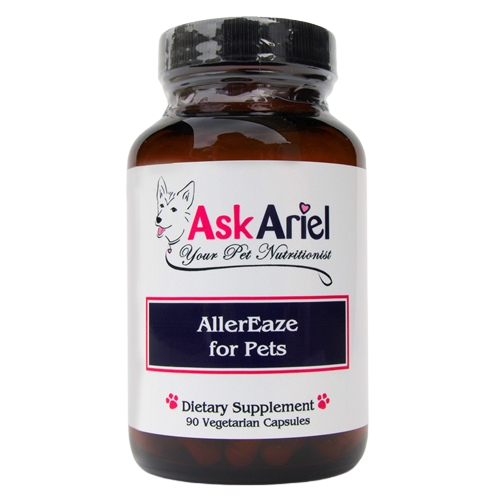 AllerEaze - All-natural AllerEaze is a dog allergy supplement that contains scientifically proven quercetin, which reduces your dog's histamine response and can take the edge off allergy symptoms. Prescription allergy medications for dogs may provide temporary relief but can have side effects like drowsiness. Quercetin is a natural antihistamine that doesn't cause drowsiness and is often referred to as "Nature's Benadryl". AllerEaze is an herbal blend containing quercetin and nettle leaf. Nettle leaf has anti-inflammatory properties that also help relieve dog allergy symptoms. Clients use AllerEaze in combination with Power Probiotic and Olive Leaf Extract for relief for atopic dermatitis and red, irritated skin. AllerEaze - All-natural AllerEaze is a dog allergy supplement that contains scientifically proven quercetin, which reduces your dog's histamine response and can take the edge off allergy symptoms. Prescription allergy medications for dogs may provide temporary relief but can have side effects like drowsiness. Quercetin is a natural antihistamine that doesn't cause drowsiness and is often referred to as "Nature's Benadryl". AllerEaze is an herbal blend containing quercetin and nettle leaf. Nettle leaf has anti-inflammatory properties that also help relieve dog allergy symptoms. Clients use AllerEaze in combination with Power Probiotic and Olive Leaf Extract for relief for atopic dermatitis and red, irritated skin.
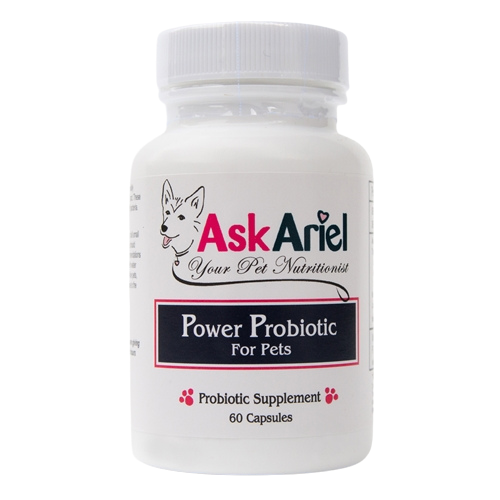 Power Probiotic - Power Probiotic is the best probiotic for dogs with allergies! Controlling allergies starts with good digestion. The skin is an elimination organ, and so using Power Probiotic is your dog's first defense toward building a strong immune system. Backed by scientific research, this powerful multi-strain probiotic supplement promotes the growth of good, friendly bacteria which boosts your pet's immune system. Because it fights infection and yeast, Power Probiotic is essential if your pet has taken antibiotics. Research* shows probiotic supplements can reduce skin sensitivity and promote the balance of healthy bacteria on the skin to reduce inflammation. Pure and natural. It is especially helpful for pets with skin problems, yeast and allergies. Many pets love the taste of the Power Probiotic! Power Probiotic - Power Probiotic is the best probiotic for dogs with allergies! Controlling allergies starts with good digestion. The skin is an elimination organ, and so using Power Probiotic is your dog's first defense toward building a strong immune system. Backed by scientific research, this powerful multi-strain probiotic supplement promotes the growth of good, friendly bacteria which boosts your pet's immune system. Because it fights infection and yeast, Power Probiotic is essential if your pet has taken antibiotics. Research* shows probiotic supplements can reduce skin sensitivity and promote the balance of healthy bacteria on the skin to reduce inflammation. Pure and natural. It is especially helpful for pets with skin problems, yeast and allergies. Many pets love the taste of the Power Probiotic!
*Reference: Research study: Health effects of probiotics on the skin. Crit Rev Food Sci Nutr.. 2015;55(9):1219-40.
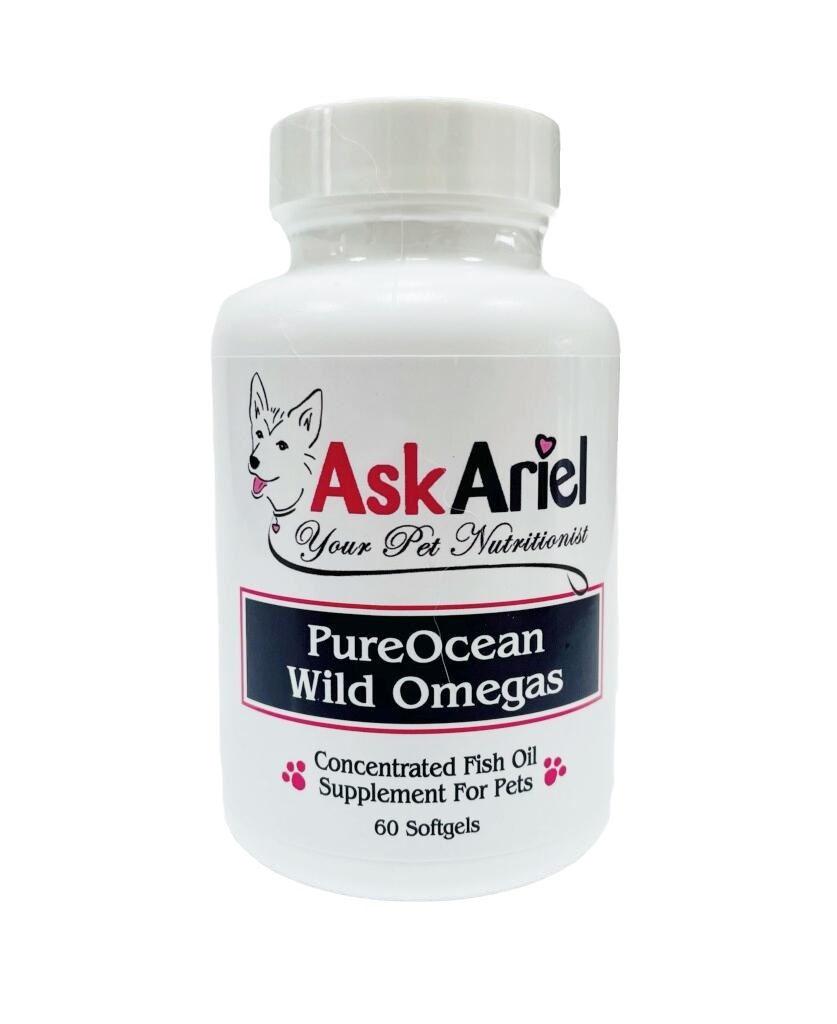 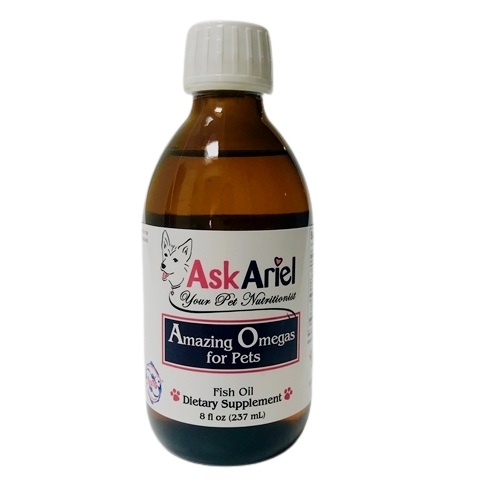
The omega-3 fatty acids found in fish oil are one of the best dog allergy supplements because they provide relief for dry, itchy skin. Omega-3 fatty acids have anti-inflammatory effects, which can help reduce the inflammation associated with allergic reactions. They help to maintain the skin barrier and reduce itching to help prevent secondary skin infections caused by excessive scratching. Our high-quality, purified fish oils contain a powerhouse of omega-3 fatty acids from sardines, anchovies and mackerel.
PureOcean Wild Omegas are concentrated, easy-to-use softgels. They have a natural fishy flavor and many pets love the taste.
Amazing Omegas is our original liquid fish oil supplement for dogs. Processed with minimal heat to preserve the oil in a highly bioavailable form, which means increased absorption. It's packed in glass bottles to prevent any chemicals from plastic leaching into the oil. Amazing Omegas are made with a lemon scent and some finicky pets may not like the taste.
Add-On Supplements For Dogs With Skin Infections, Pustules & Redness
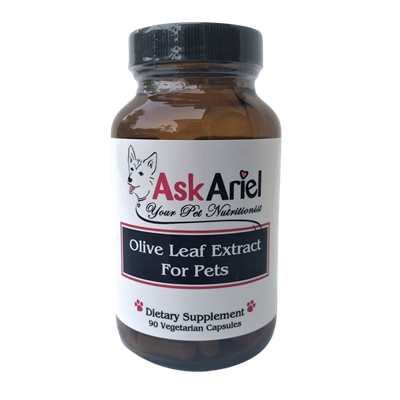 Olive Leaf Extract For Pets - A natural antibacterial herbal remedy that has been used since ancient times. Helpful for dogs with allergies, ear infections, skin infections and yeast overgrowth (tear-stained eyes, ear discharge, cheesy smell, licking groin, yeasty paws). Dogs use their skin to help remove toxins from their bodies and a build-up of toxins can cause red, itchy and smelly skin. Olive Leaf Extract is a natural alternative to antibiotics prescribed for skin conditions like atopic dermatitis in dogs. Its active ingredient, oleuropein, helps fight against pathogens while causing no harm to healthy bacteria in your pet's gut and mucous membranes. Olive Leaf Extract has antioxidant properties to help relieve the irritation and inflammation caused by skin infections. Olive Leaf Extract For Pets - A natural antibacterial herbal remedy that has been used since ancient times. Helpful for dogs with allergies, ear infections, skin infections and yeast overgrowth (tear-stained eyes, ear discharge, cheesy smell, licking groin, yeasty paws). Dogs use their skin to help remove toxins from their bodies and a build-up of toxins can cause red, itchy and smelly skin. Olive Leaf Extract is a natural alternative to antibiotics prescribed for skin conditions like atopic dermatitis in dogs. Its active ingredient, oleuropein, helps fight against pathogens while causing no harm to healthy bacteria in your pet's gut and mucous membranes. Olive Leaf Extract has antioxidant properties to help relieve the irritation and inflammation caused by skin infections.
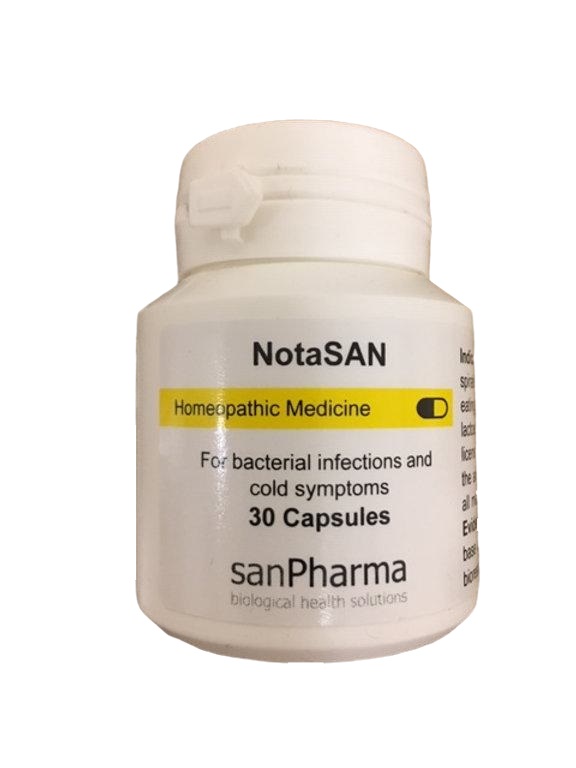
NotaSAN Capsules - NotaSAN is a homeopathic remedy for dog allergies that helps calm allergy symptoms. The antibacterial properties of NotaSAN Capsules offer a unique and effective option for treating allergies and fighting infections. NotaSAN Capsules act like a natural antibiotic for dogs and helps doggie odor, skin redness, and pustules. It controls harmful bacteria and restores gut flora balance. Combines well with K9 Yeast Defense. Use NotaSAN Capsules to help prevent recurring skin infections.
Add-On Supplements For Dogs With Smelly Armpits & Ear Infections
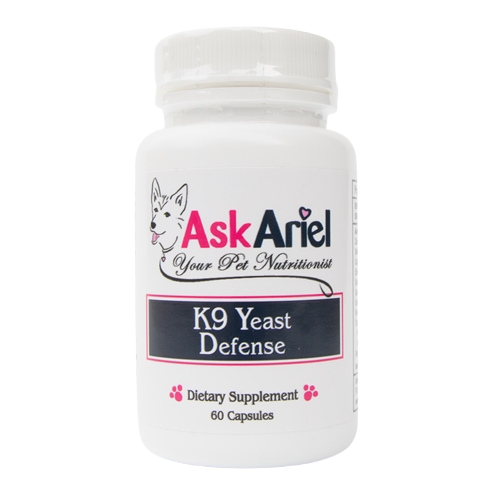 K9 Yeast Defense - Many dogs constantly scratch due to an underlying yeast condition. If your dog has had ear infections or a smelly odor, especially on the paws, then use K9 Yeast Defense in conjunction with allergy products. This natural antifungal supplement stops doggie odor, chronic ear infections, licking at the groin and scratching at the ears. K9 Yeast Defense is a safe way to get rid of yeast infection symptoms and support your pet's immune system. Since yeast and bacterial growth go hand in hand, it's best to use K9 Yeast Defense along with NOT Drops and Power Probiotic. K9 Yeast Defense - Many dogs constantly scratch due to an underlying yeast condition. If your dog has had ear infections or a smelly odor, especially on the paws, then use K9 Yeast Defense in conjunction with allergy products. This natural antifungal supplement stops doggie odor, chronic ear infections, licking at the groin and scratching at the ears. K9 Yeast Defense is a safe way to get rid of yeast infection symptoms and support your pet's immune system. Since yeast and bacterial growth go hand in hand, it's best to use K9 Yeast Defense along with NOT Drops and Power Probiotic.
What to Feed Dogs With Allergies?
Allergies in pets can be caused by seasonal allergens (e.g. pollen), food and/or external allergens (e.g. chemical exposure). One of the fastest ways to improve allergic reactions is to improve their diet. Many dogs are allergic to certain meat proteins (like poultry or beef) and common allergens such as corn, milk products, soy, peanut butter and gluten (found in wheat, barley, spelt and other grains). Poor digestion can also be a root cause of many symptoms related to food allergies in dogs, so we strongly recommend that any pet with allergy symptoms use Power Probiotic as well as a digestive enzyme such as K9 Digestive Enzymes or LypoZyme. Adding omegas in the form of fish oil, baked fish or sardines can be helpful.
Ask Ariel's Pet Nutritionist offered holistic consultations in conjunction with veterinarians at VCA hospitals for over 10 years. Her diets and supplement protocols for dogs with allergies, yeast and skin problems have been recommended by veterinarians nationwide. When ordering allergy supplements for dogs, please include your dog's diet and treats on the order form at checkout. We will include free diet tips for dogs with allergies and skin problems on the packing slip that comes with your order. Our low carbohydrate, novel protein diet tips have been giving dogs anti-itch relief since 2005.
Chocolate Chips
"Just a bit of history, we got our Chorkie when she was about 9 weeks old. We truly believe she was the runt or just didn't get enough milk from her mother. She was not in good shape. She is 2 years old now. Since we got her until now she's had different health issues but the allergies have been the worst. We've spent thousands on vet visits, medications, natural treatments, etc. to no avail. Well, not until I found Ask Ariel while doing a Google search. I ordered some of the recommended supplements for allergies and gut issues. I have to say I was skeptical at first, but I am happy to report our Chorkie, Chocolate Chips, has improved significantly! I am so thankful that I found Ask Ariel." - Liza, Texas
Products Used: K9 Digestive Enzymes, NOT Drops, K9 Yeast Defense and Power Probiotic.
Originally published Oct 11, 2020
Updated Aug 30, 2024
Written by: Susan Davis, Pet Health Nutritionist, CCN
All pet treatment protocols and pet treatment supplements have been reviewed and approved by a veterinarian
|
|
|
How do I know if my dog has allergies?
Common symptoms of allergies in dogs are constant scratching, itching, licking especially of the paws, chewing, red bumps and rashes, hot spots, hair loss and ear infections. Dogs with food allergies may experience digestive problems such as vomiting and diarrhea.
Why is my dog itching and scratching?
Excessive itching is called pruritus and it can be caused by environmental or food allergies, fleas, ticks, parasites, bacterial or yeast infections, dry skin or mast cell tumors. It’s very important to bring your dog to the veterinarian to get a diagnosis, especially since there are so many different causes of scratching and itching.
Why is my dog always scratching but doesn't have fleas?
Fleas aren’t the only reason that dogs scratch themselves. Many dogs itch and scratch due to allergies or dry skin. Diet is also an important cause of itching and skin problems in dogs. Feeding a hypoallergenic, novel protein diet is helpful. Omega-3 fatty acids in the form of fish oil relieves inflammation, helps allergy symptoms and can give dogs a lustrous, shiny coat.
What can I give my dog for allergies over the counter?
The best natural remedy for dog allergies is quercetin. It has been referred to as a natural “Benadryl”. Quercetin is a bioflavonoid with antioxidant and anti-inflammatory properties that suppresses the histamine response that causes the itch and inflammation. AllerEaze is an herbal blend of quercetin and nettle leaf to provide powerful antihistamine relief to dogs and cats with allergy symptoms such as excessive scratching and itching, constant licking, red skin, hair loss and hot spots.
What can I give my cat for allergies?
Quercetin is helpful for cat allergies. Quercetin naturally reduces the histamine response. A probiotic is also very important for cat allergies as food allergies are a common culprit for cat allergy symptoms.
How can you help cat or dog itchy skin?
The fastest way to help your cat or dog with itchy skin is from the inside out. Many pets with dry or itchy skin have allergies and the food they are eating can be the biggest culprit. Dogs and cats can be allergic to many common meat proteins and ingredients such as corn, soy and gluten. Essential fatty acids (EFAs) have been scientifically shown to be helpful for allergies. Many commercial pet foods do not contain a sufficient amount of omega-3s. Adding a few supplements to your pet’s regimen to reduce allergy symptoms can also give them much needed relief from constant scratching and itching.
What is a natural hot spot treatment for dogs and cats?
Most topical hot spot treatments will only work temporarily to ease the itching and redness. The best natural hot spot treatment is to determine the source of the itch. Pets that suffer from seasonal or environmental allergies do not get runny noses or watery eyes like people, their immune systems respond with itchy skin, redness and hives. Your cat or dog may constantly bite and lick, creating hot spots. The best way to prevent hot spots and allergies is to avoid the triggers. Many pet foods, even premium brands, contain ingredients that your dog or cat may be sensitive to. It is important to read the labels to see what is really in the food and to add natural supplements, like Power Probiotic to boost the immune system, AllerEaze to suppress the histamine response and Amazing Omegas to reduce inflammation.
|
|
|